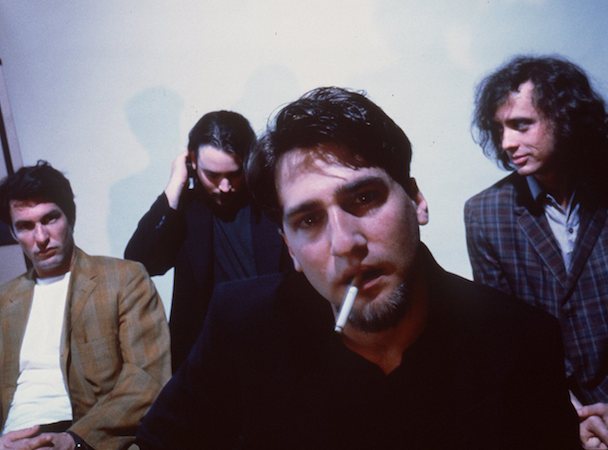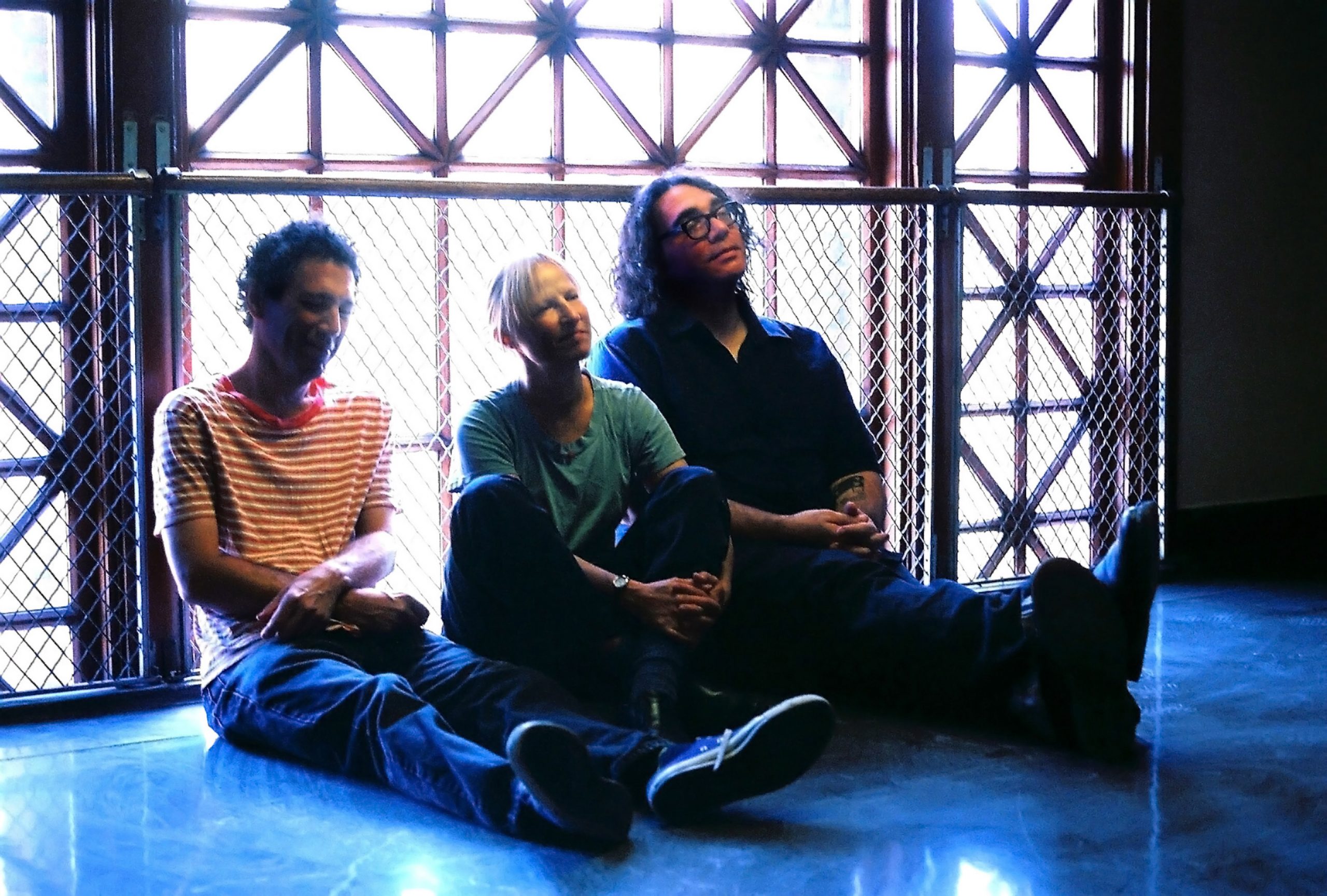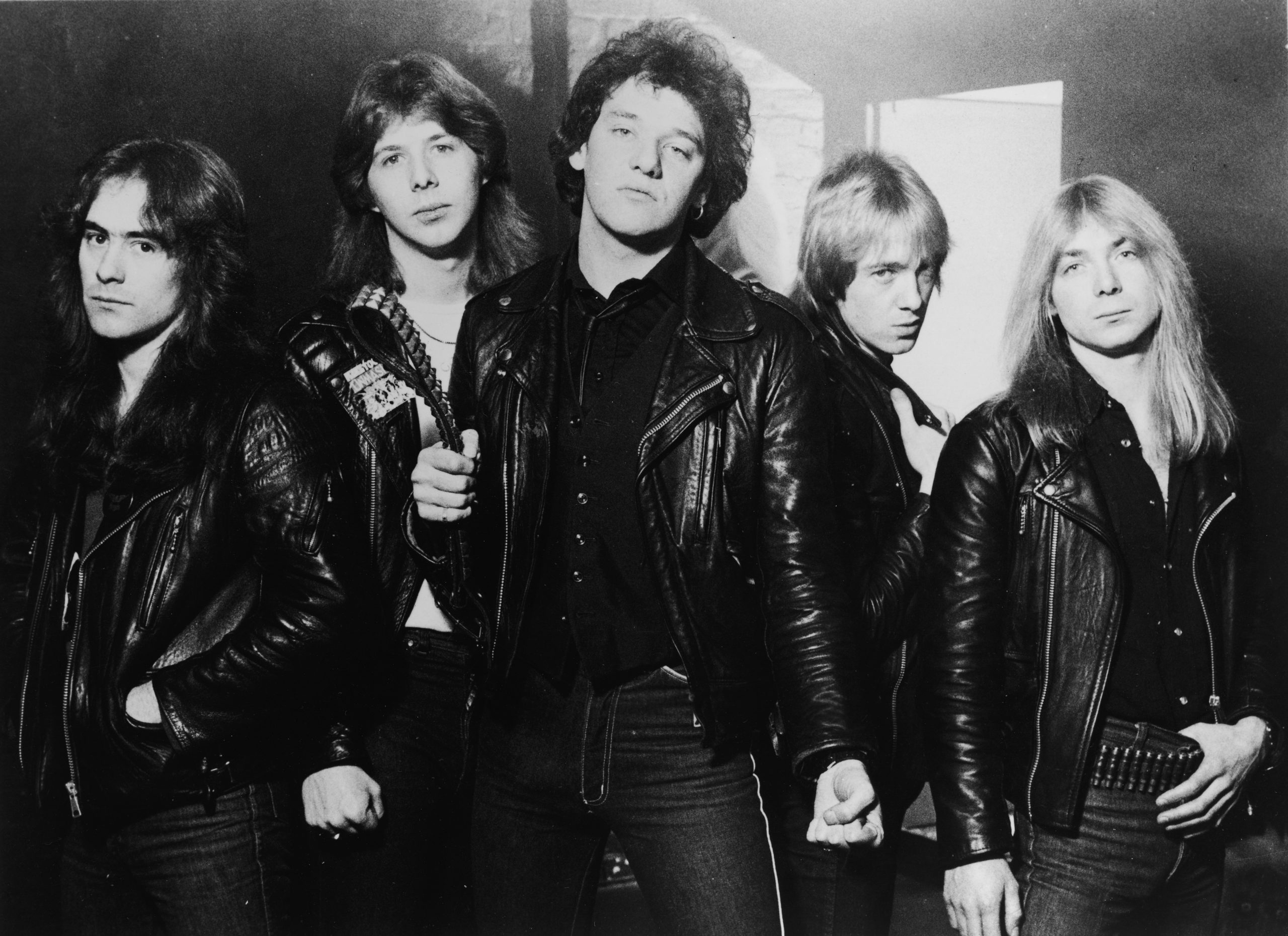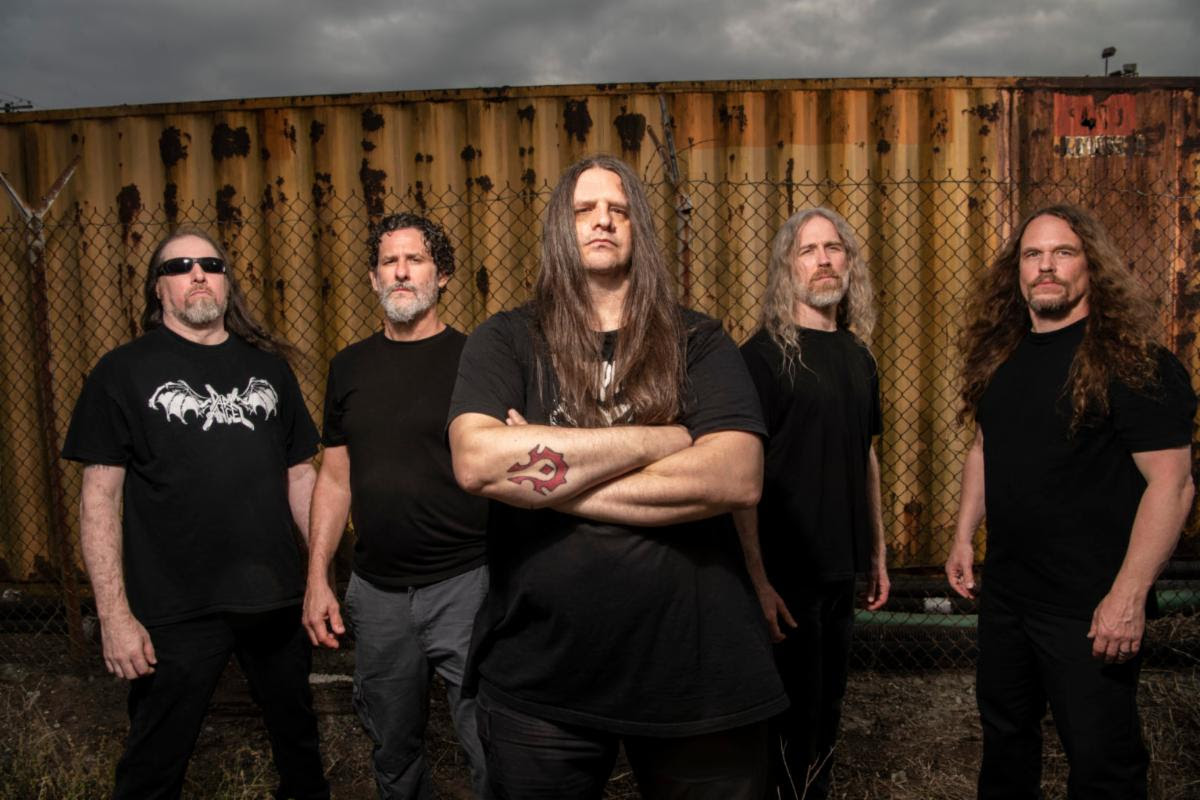Never trust a man who says he knows what the meaning of life is. That is unknowable, and maybe nonexistent. However, I know damn well what the point of life is: to procreate, and in so doing, fornicate. To the best of our scientific knowledge, six billion years of evolution has gone into making all of us, men and women, want to bang. Often. The urge to fuck is one of the most basic, relatable mental processes in the world, and one intimately related to love -- the subject of more songs and poems than any other subject (my money is on war in second place, and just plain physical sex as a close third). And yet, somewhere along the way, it became un-hip to write music about sex, at least too overtly.
But let's cut away the bullshit. There is nothing wrong with cock-rock. Actually, cock-rock is kind of awesome. Enter the Afghan Whigs. The Cincinnati four-piece came into their own in the late '80s and early '90s alternative scene, a collective of bands that rejected the cock-rock ethos, and for good reason: The '80s hair metal scene had taken sexual rock and roll to such extremes as to render it absurd. Unlike their contemporaries, though, the Afghan Whigs gloried in bacchanalia, making them unique among the bands they often shared labels with. On the other hand, their approach to cock-rock was distinct from the woman-devouring bands that preceded them.
You could call them progressive. The Afghan Whigs, and especially guitarist/vocalist/songwriter Greg Dulli, understood that even the most Caucasian rock is at its heart derived from African American music, and sexuality is an intimate part of that -- they don't call him Elvis the Pelvis without good reason. So while rock bands emulated rock bands, Dulli took things back to basics, taking his cues from soul and R&B music. While Kurt Cobain re-branded the hellish blues torture of Robert Johnson, Dulli glorified the melancholy-but-libidinous tunes of the Supremes, Barry White, and even TLC, albeit with a darker twist. Instead of blue-eyed soul, let's call it black-hearted.
It was, and remains, a unique take on rock music, and today, even though the Afghan Whigs enjoyed some modest commercial success, their influence on modern rock and pop music is less than apparent. Bands like Interpol and Jimmy Eat World have earned the occasional comparison, but don't really sound like the Afghan Whigs (the sole exception that comes to mind is Maroon 5's critically underrated debut album Songs About Jane -- had they continued in the soul-rock vein, I might still buy their albums).
When I counted down Josh Homme's albums for Stereogum, a commenter said, "In a perfect world, Queens [Of The Stone Age] and Afghan Whigs would have conquered the charts instead of Creed and Nickelback." I'm inclined to agree with him -- and a little surprised that the Whigs never reached arena status. They have the songs, the hooks, and later in their career, the production value. Cynically, it might have something to do with the band's aesthetic (there was a classic fanzine called "Fat Greg Dulli," if that tells you something). But more realistically, I think their uniqueness became a detriment. Standing out in a crowd is good for a job search, but bad for rock superstardom, leaving the Whigs in a genre of solitary confinement.
Of course, the Whigs were born when Greg Dulli (supposedly) met lead guitarist Rick McCollum in an Athens, OH jail cell, after being taken into custody for disorderly conduct. The band assumed regular operations in Cincinnati, which begs the question: What exactly were the two doing in Athens? The same thing everyone does in Athens: getting drunk and disorderly (as proof, research the Ohio University's Halloween celebration festivities). As a fellow Ohioan I can attest, this state breeds a special kind of asshole. We're the state that keeps racist baseball mascots long past their expiration dates, and that glorifies its Big 10 football team's ability to trounce their rivals from a smaller, better-educated Michigan town. Fuck small. Fuck educated. Of course my home state produced the world's artsiest cock-rock band.
Eventually, the center ceased to hold and the Afghan Whigs called it quits in 2001, leaving Dulli to embark on a semi-solo career leading the Twilight Singers and doing a few albums with Mark Lanegan. However, recently the band reunited sans-McCollum, leaving Dulli and John Curley as the only permanent members of the band (a good thing, too, as Curley's dexterous Rickenbacker-playing is as essential to the band as Dulli's crass sexuality). Energized by a successful reunion tour in 2012, and a unique, popular set with Usher at SXSW in 2013, the band is back in action with a new record and another tour this coming autumn. It seems as though this decade might be kinder to Dulli and Curley than the '90s were.
After all, the era of free love is over. The era of cheap sex, however, is here to stay. The Afghan Whigs' subject matter is more relevant now than ever, and their music just as unique as it was when it was new. Next month, Sub Pop will release a book of Dulli's photographs -- alongside haiku by Danny Bland and calligraphy by Exene Cervenka -- called I Apologize in Advance For The Awful Things I'm Gonna Do. So this is an apt time to look back at Dulli's work with the Whigs ... and apologize in advance for what we're gonna do.
[videoembed size="full_width" alignment="center"][/videoembed]
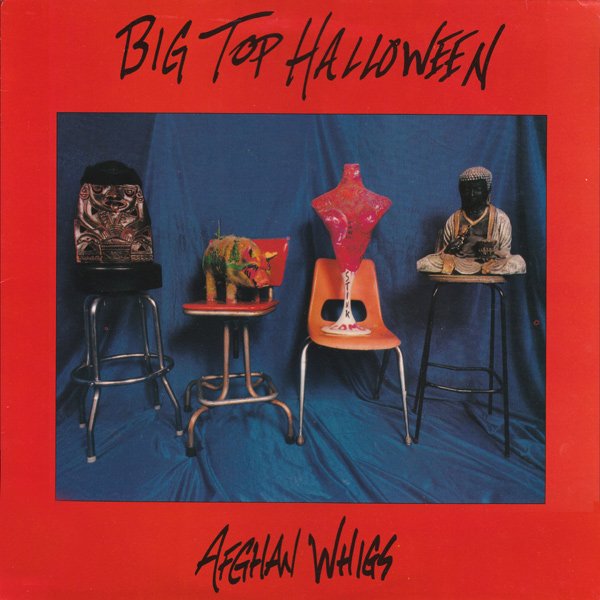
The Afghan Whigs' self-released 1988 debut record, Big Top Halloween, bears little resemblance to the albums that would earn the band their reputation. Even though the first song the group ever recorded was a cover of the Temptations' "Psychedelic Shack," there is almost no R&B influence to be found on their first full-length. Instead, inquisitive listeners should expect an eclectic mixture of indie rock and hardcore punk, alongside various other rock and roll experiments. It's easy to see why Sub Pop Records co-founder Jonathan Poneman signed the Whigs after spinning one of the 1000 copies of Big Top -- it's an accomplished album for a band that had only been together for a little more than a year at the time of its recording, but prime Whigs it is not.
Although its individual songs are good -- sometimes great -- Big Top Halloween suffers from an identity crisis. Charitably, one could call it eclectic, but maybe the better term is scatterbrained. The Whigs sound like they're trying to be a million other bands rather than themselves. "Push" opens a bit like an Iron Maiden song and then tries its best to sound like U2. "Doughball" is a straight-up ska punk track, while "Back O' The Line" pairs blues licks and swing time. The first two tracks, "Here Comes Jesus" and "In My Town," sound a bit like a lo-fi take on Fleetwood Mac, but with five-second bursts of Eddie Van Halen solos, courtesy of McCollum, whose performance on this album really stands out. McCollum had a reputation in Cincinnati as a man who knew his way around a pedal board, and he uses that knowledge to emulate hair metal, surf rock, and even Crazy Horse at various times (in fact, the band's alt-country song "Life In A Day" is a standout).
The best songs on Big Top Halloween, including the title cut and especially the best track, "Scream," evoke a mix of the Heartbreakers and the Dead Kennedys, sentimental one second and aggressive the next. It's actually still a pretty great brand of rock and roll, but in all honesty, the Replacements were doing the same thing at the same time, except better. However, that ability to evoke tenderness and rage in the same song would later serve to be Dulli's greatest strength as a songwriter, but here he's the least-essential member of the Whigs. In fact, his first stab at balladry, "But Listen," is the odd song out on the album, a clunky bit of sentimentality with a honky-tonk piano that descends into a speed-punk burst at the end anyway. His lyrics already show a propensity for sexual innuendo, but there's a bit too much "baby baby" to qualify as poetry. Like the rest of the album, it shows important hints of where the Whigs would take themselves later, but nobody should be upset that Dulli doesn't play it anymore. As a period piece, though, Big Top Halloween is still a forward-thinking and exciting picture of where alternative rock was in the late '80s, ready to break into full-blown renaissance. I would have signed this band too.
The Afghan Whigs' self-released 1988 debut record, Big Top Halloween, bears little resemblance to the albums that would earn the band their reputation. Even though the first song the group ever recorded was a cover of the Temptations' "Psychedelic Shack," there is almost no R&B influence to be found on their first full-length. Instead, inquisitive listeners should expect an eclectic mixture of indie rock and hardcore punk, alongside various other rock and roll experiments. It's easy to see why Sub Pop Records co-founder Jonathan Poneman signed the Whigs after spinning one of the 1000 copies of Big Top -- it's an accomplished album for a band that had only been together for a little more than a year at the time of its recording, but prime Whigs it is not.
Although its individual songs are good -- sometimes great -- Big Top Halloween suffers from an identity crisis. Charitably, one could call it eclectic, but maybe the better term is scatterbrained. The Whigs sound like they're trying to be a million other bands rather than themselves. "Push" opens a bit like an Iron Maiden song and then tries its best to sound like U2. "Doughball" is a straight-up ska punk track, while "Back O' The Line" pairs blues licks and swing time. The first two tracks, "Here Comes Jesus" and "In My Town," sound a bit like a lo-fi take on Fleetwood Mac, but with five-second bursts of Eddie Van Halen solos, courtesy of McCollum, whose performance on this album really stands out. McCollum had a reputation in Cincinnati as a man who knew his way around a pedal board, and he uses that knowledge to emulate hair metal, surf rock, and even Crazy Horse at various times (in fact, the band's alt-country song "Life In A Day" is a standout).
The best songs on Big Top Halloween, including the title cut and especially the best track, "Scream," evoke a mix of the Heartbreakers and the Dead Kennedys, sentimental one second and aggressive the next. It's actually still a pretty great brand of rock and roll, but in all honesty, the Replacements were doing the same thing at the same time, except better. However, that ability to evoke tenderness and rage in the same song would later serve to be Dulli's greatest strength as a songwriter, but here he's the least-essential member of the Whigs. In fact, his first stab at balladry, "But Listen," is the odd song out on the album, a clunky bit of sentimentality with a honky-tonk piano that descends into a speed-punk burst at the end anyway. His lyrics already show a propensity for sexual innuendo, but there's a bit too much "baby baby" to qualify as poetry. Like the rest of the album, it shows important hints of where the Whigs would take themselves later, but nobody should be upset that Dulli doesn't play it anymore. As a period piece, though, Big Top Halloween is still a forward-thinking and exciting picture of where alternative rock was in the late '80s, ready to break into full-blown renaissance. I would have signed this band too.
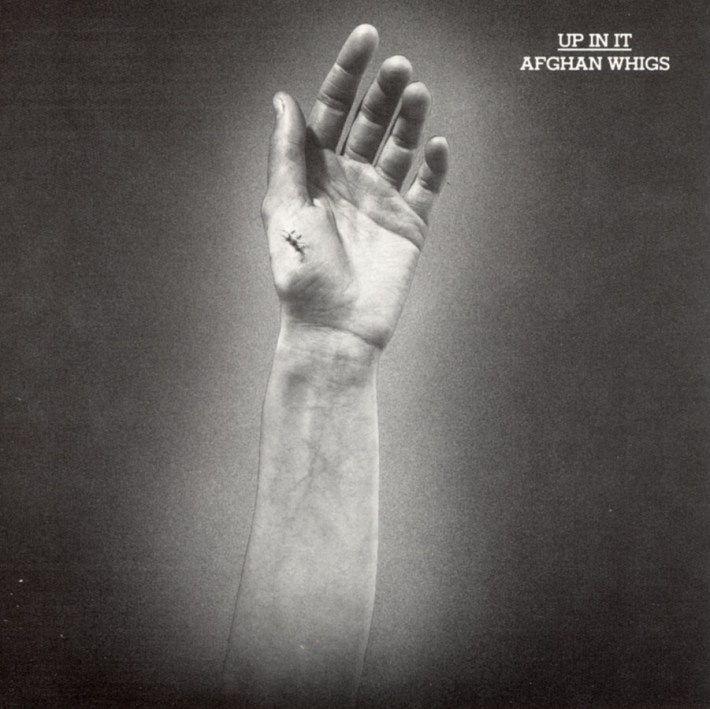
Out of all the Whigs' releases, Up In It is the most direct, angry burst of sound. More single-minded than its predecessor, the album trafficks in distortion-coated guitars busting out simple chords in rapid, forceful succession. It's a sound that still exists today -- occasionally Fucked Up and Coliseum evoke this same mix of indie rock, grunge, and hardcore -- but not the sound that would define the band.
Invigorated by the unexpected underground popularity of their self-released debut, and a fresh record deal with Seattle's Sub Pop Records, the Afghan Whigs recorded Up In It in 1990. At that point in time, Sub Pop was a rising force in American rock music, anchored by golden-boy status with the British music press as well as a distinct musical sound: grunge. The Afghan Whigs were one of the first bands from outside the Pacific Northwest to ink a deal with Sub Pop, but made no efforts to sound distinct from their new and esteemed peers. After all, Sub Pop had just released two critically acclaimed debut albums by Mudhoney and Nirvana. Both groups (at the time) seemed poised for some sort of greater success; Bleach in particular had charted above expectations despite a weak publicity push from the label. Also, perhaps most tellingly, another Seattle band, Soundgarden, had just broken into the Billboard Top 200 with their album Louder Than Love. The Whigs did their best to fit right in, recording in Seattle with Sub Pop's producer of choice, Jack Endino.
From the get-go, Up In It seems out to please early '90s alternative fanatics by disgusting 'normal' listeners in any way possible. At that point in time, alternative rock bands, inspired by early hardcore, attempted to outdo one another with darker lyrics and more massive walls of cheap fuzz. The Whigs, already skilled with guitar pedals, added some gross offensiveness to the list. The first two songs are titled "Retarded" and "White Trash Party," for god's sake. "Hated" bequeaths this little Dulli gem: "Understand my need to offend / Come home & smack the woman around / Tried to apologize / But she deserved it, that I know / Strangled with her pantyhose." Dulli would take similar themes to interesting poetic heights later in his career, but at this point it's not just crass, it's as laughable as his lyrical angst.
Musically, however, Up In It presents an interesting alternative history for the Whigs, one where McCollum's dive-bomb guitar is the musical focal point. On much of Up In It his riffs first purr, then screech with the menace of a Stuka engine. As his wingman, John Curley whips up some surprisingly funky basslines, taking cues from his contemporary, Flea, and mixing in chorded slap-and-pops with his fingerpicking runs. He wouldn't be this adventurous again until 1998. As frontman and songwriter, Dulli needed to step up his game. And if that meant leaving the mosh pits behind, so be it. His interests lay elsewhere, and would take his band someplace altogether more interesting than the early '90s Seattle B-list.
Out of all the Whigs' releases, Up In It is the most direct, angry burst of sound. More single-minded than its predecessor, the album trafficks in distortion-coated guitars busting out simple chords in rapid, forceful succession. It's a sound that still exists today -- occasionally Fucked Up and Coliseum evoke this same mix of indie rock, grunge, and hardcore -- but not the sound that would define the band.
Invigorated by the unexpected underground popularity of their self-released debut, and a fresh record deal with Seattle's Sub Pop Records, the Afghan Whigs recorded Up In It in 1990. At that point in time, Sub Pop was a rising force in American rock music, anchored by golden-boy status with the British music press as well as a distinct musical sound: grunge. The Afghan Whigs were one of the first bands from outside the Pacific Northwest to ink a deal with Sub Pop, but made no efforts to sound distinct from their new and esteemed peers. After all, Sub Pop had just released two critically acclaimed debut albums by Mudhoney and Nirvana. Both groups (at the time) seemed poised for some sort of greater success; Bleach in particular had charted above expectations despite a weak publicity push from the label. Also, perhaps most tellingly, another Seattle band, Soundgarden, had just broken into the Billboard Top 200 with their album Louder Than Love. The Whigs did their best to fit right in, recording in Seattle with Sub Pop's producer of choice, Jack Endino.
From the get-go, Up In It seems out to please early '90s alternative fanatics by disgusting 'normal' listeners in any way possible. At that point in time, alternative rock bands, inspired by early hardcore, attempted to outdo one another with darker lyrics and more massive walls of cheap fuzz. The Whigs, already skilled with guitar pedals, added some gross offensiveness to the list. The first two songs are titled "Retarded" and "White Trash Party," for god's sake. "Hated" bequeaths this little Dulli gem: "Understand my need to offend / Come home & smack the woman around / Tried to apologize / But she deserved it, that I know / Strangled with her pantyhose." Dulli would take similar themes to interesting poetic heights later in his career, but at this point it's not just crass, it's as laughable as his lyrical angst.
Musically, however, Up In It presents an interesting alternative history for the Whigs, one where McCollum's dive-bomb guitar is the musical focal point. On much of Up In It his riffs first purr, then screech with the menace of a Stuka engine. As his wingman, John Curley whips up some surprisingly funky basslines, taking cues from his contemporary, Flea, and mixing in chorded slap-and-pops with his fingerpicking runs. He wouldn't be this adventurous again until 1998. As frontman and songwriter, Dulli needed to step up his game. And if that meant leaving the mosh pits behind, so be it. His interests lay elsewhere, and would take his band someplace altogether more interesting than the early '90s Seattle B-list.
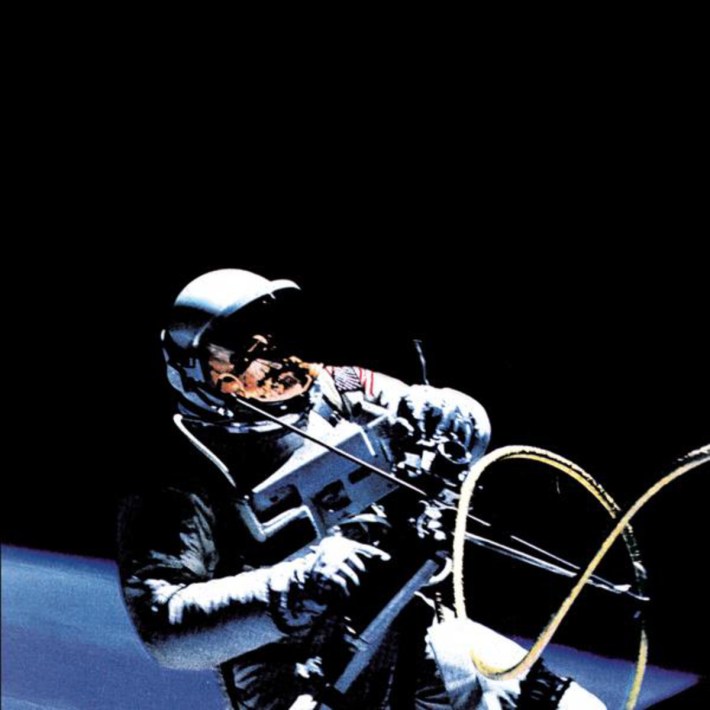
To say that 1965 had a troubled production would be an understatement. The album was actually re-forged from the broken pieces of an unfinished sixth album to be called Stand Up To Get Down. Dulli eventually scuttled that record in 1998 and saved its best bits for 1965. (As it stands, the only song on the album that was probably taken wholesale from the Stand Up To Get Down sessions is likely "66," the only song recorded in Seattle, and one that sticks out like a sore thumb). It's easy to see why Dulli abandoned the Puget Sound -- grunge had officially dissolved into bland pop music, thanks to a host of bands aping Dulli's own sound. Meanwhile, the Whigs' experimental masterpiece, Black Love, underperformed after receiving no push from Elektra, prompting Dulli to leave his contract and record much of 1965 on his own dime, before the album found its eventual home at Columbia. Along the way, Dulli found himself so despondent with the Whigs that he recorded the debut album of his side project, the Twilight Singers, and spent some time in Seattle's Virginia Mason Medical Center recovering from clinical depression. I can't blame the man for jumping ship; the Pacific Northwest is achingly beautiful, but dreary and wet. Dulli needed the change of scenery, as well as direction, but his new choice of home still carried a sense of the macabre. 1965 was finished in esteemed producer Daniel Lanois' purportedly haunted Kingsway Studios in New Orleans, home of voodoo, Anne Rice, Trent Reznor, corrupt cops, and citywide open carry laws -- perfect for a man like Dulli, known to put a little too much strain on his liver. (Supposedly Dulli almost never saw Lanois, who only emerged from hiding at odd hours of the night, hence the closing song "The Vampire Lanois.")
Surprisingly, though, 1965 turned out to be the brightest, most celebratory record in the Whigs' catalog, despite its ghostly origin story. Think of it as the chaser to the stiff shot that was Black Love. Opener "Somethin' Hot" find the Whigs in full party band form, anchored by Curley's fattest bass sound yet. On that song, it sounds like he's been moonlighting in Chic (full disclosure: I feel the longer 10" single version is superior). Meanwhile, the sounds of New Orleans, including snatches of Dixieland jazz, reggae, and soul, manifest themselves throughout the album courtesy of enough hired musicians to constitute a mercenary army.
In fact, there's so much production that it drowns out the Whigs sometimes. For example "Citi Soleil," with its layers of backup vocals, Spanish guitar, electric organ, street samples, and steel drum, is a song that would be nearly impossible to play live as it is on album, even with Dulli's cadre of session musicians -- the song was not written, it was made. Which isn't necessarily a problem, especially if, like me, you're no studio purist. But when it's hard to taste the cake beneath the frosting there's a bit of a problem.
Likewise, those enamored of the vitriol of Gentlemen or Black Love will find slim pickings here. The lone song that finds Dulli in full maniac mode is "Neglekted," originally titled "Sylvia," as in Sylvia Rhone, the president of Elektra Records, which winds up sounding like a sort of masculine counterpart to Alanis Morissette's "You Oughta Know." The song's aged about as well as that first Alanis album, complete with troublesome, trip-hoppy late '90s production.
Then again, just as often as the Whigs misstep, they get the balance perfect. "John The Baptist," Dulli's own favorite song on the album, is one of his all-time best, as necessary as "Gentlemen" or "Faded." Its mix of Dixieland horns, soul vocals, wah guitar and genuinely driving rhythm marries Some Girls-era Rolling Stones with the burliness of Faith No More, and in the process pretty much renders funk rock as a genre moot -- it doesn't get better than this.
To say that 1965 had a troubled production would be an understatement. The album was actually re-forged from the broken pieces of an unfinished sixth album to be called Stand Up To Get Down. Dulli eventually scuttled that record in 1998 and saved its best bits for 1965. (As it stands, the only song on the album that was probably taken wholesale from the Stand Up To Get Down sessions is likely "66," the only song recorded in Seattle, and one that sticks out like a sore thumb). It's easy to see why Dulli abandoned the Puget Sound -- grunge had officially dissolved into bland pop music, thanks to a host of bands aping Dulli's own sound. Meanwhile, the Whigs' experimental masterpiece, Black Love, underperformed after receiving no push from Elektra, prompting Dulli to leave his contract and record much of 1965 on his own dime, before the album found its eventual home at Columbia. Along the way, Dulli found himself so despondent with the Whigs that he recorded the debut album of his side project, the Twilight Singers, and spent some time in Seattle's Virginia Mason Medical Center recovering from clinical depression. I can't blame the man for jumping ship; the Pacific Northwest is achingly beautiful, but dreary and wet. Dulli needed the change of scenery, as well as direction, but his new choice of home still carried a sense of the macabre. 1965 was finished in esteemed producer Daniel Lanois' purportedly haunted Kingsway Studios in New Orleans, home of voodoo, Anne Rice, Trent Reznor, corrupt cops, and citywide open carry laws -- perfect for a man like Dulli, known to put a little too much strain on his liver. (Supposedly Dulli almost never saw Lanois, who only emerged from hiding at odd hours of the night, hence the closing song "The Vampire Lanois.")
Surprisingly, though, 1965 turned out to be the brightest, most celebratory record in the Whigs' catalog, despite its ghostly origin story. Think of it as the chaser to the stiff shot that was Black Love. Opener "Somethin' Hot" find the Whigs in full party band form, anchored by Curley's fattest bass sound yet. On that song, it sounds like he's been moonlighting in Chic (full disclosure: I feel the longer 10" single version is superior). Meanwhile, the sounds of New Orleans, including snatches of Dixieland jazz, reggae, and soul, manifest themselves throughout the album courtesy of enough hired musicians to constitute a mercenary army.
In fact, there's so much production that it drowns out the Whigs sometimes. For example "Citi Soleil," with its layers of backup vocals, Spanish guitar, electric organ, street samples, and steel drum, is a song that would be nearly impossible to play live as it is on album, even with Dulli's cadre of session musicians -- the song was not written, it was made. Which isn't necessarily a problem, especially if, like me, you're no studio purist. But when it's hard to taste the cake beneath the frosting there's a bit of a problem.
Likewise, those enamored of the vitriol of Gentlemen or Black Love will find slim pickings here. The lone song that finds Dulli in full maniac mode is "Neglekted," originally titled "Sylvia," as in Sylvia Rhone, the president of Elektra Records, which winds up sounding like a sort of masculine counterpart to Alanis Morissette's "You Oughta Know." The song's aged about as well as that first Alanis album, complete with troublesome, trip-hoppy late '90s production.
Then again, just as often as the Whigs misstep, they get the balance perfect. "John The Baptist," Dulli's own favorite song on the album, is one of his all-time best, as necessary as "Gentlemen" or "Faded." Its mix of Dixieland horns, soul vocals, wah guitar and genuinely driving rhythm marries Some Girls-era Rolling Stones with the burliness of Faith No More, and in the process pretty much renders funk rock as a genre moot -- it doesn't get better than this.
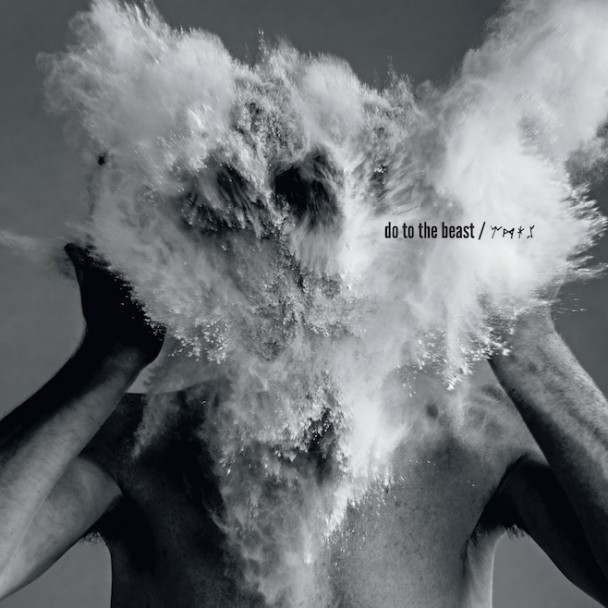
Plenty of rock bands have leveraged post-breakup popularity (largely the result of internet-fueled nostalgia) into reunion albums, mostly with mixed results. For every unlikely, triumphant return to form, such as Alice In Chains' Black Gives Way To Blue, there's a mediocre fizzle like Soundgarden's King Animal. And let's be honest, both of those are far outnumbered by simply embarrassing flops (I'm looking at both iterations of Black Flag, as well as the Pixies). Given all that, it's not surprising that Do To The Beast, the first Afghan Whigs album in sixteen years, was greeted largely by the sound of crickets. On the surface, it looks like an easy cash grab, one without Rick McCollum on board. For my money, though, I'd group Do The Beast next to Black Gives Way To Blue -- examples of how to write a great reunion album.
Do To The Beast in many ways continues where 1965 left off, presenting a series of brightly produced, groove-oriented tracks. Unlike its predecessor, though, Do To The Beast gets right to the point and refuses to overstay its welcome; that every song feels both distinct and necessary to the journey of the record is its greatest strength. All of the tricks Dulli learned in the Twilight Singers are on display in the album, from electronic beats ("The Lottery") to exotic string and horn arrangements (virtually every song). In fact, the album pushes the Whigs' formula so far that roughly half of these songs don't seem like anything the Whigs would have recorded in their past.
Things begin with a bit of nostalgic fervor. Opener "Parked Outside," driven by a merciless stomp, sounds like prime-cut Whigs. Dulli's in full-on stalker mode while bursts of electric guitar announce his presence like trumpets preceding a Roman emperor's train. Its follow-up, "Matamoros," delivers the goods as well, recasting the angsty soul spirit of the Black Love album with a more electronic drum pattern and a harmonized violin-and-guitar solo cutting through the middle of the tune. After that, things settle down a bit.
The sexual vitriol of the early Afghan Whigs material has dulled significantly since 1998, replaced with a nuanced sense of melancholy. Dulli experimented with sweeter emotions on Black Love and 1965, but "It Kills" is flat-out the most sentimental ballad he's ever penned for the Whigs, and it's an album highlight. Even the most film noir-influenced number here, "Lost In The Woods," begins as a tender piano ballad. Much of the heart-on-sleeve stuff benefits from Dulli having quit smoking. His voice is clearer on Do To The Beast than any other Whigs album, even though he still strains to reach those high notes.
Not all of the tender material works. The aforementioned "The Lottery," with its electronic beats and shimmering guitar, tries a bit too hard to sound like side B of Achtung Baby, while its follow up, "Can Rova," feels a bit too much like a castoff from Mellon Collie And The Infinite Sadness. The good news, however, is that the three songs that mop the album up are some of the best in Dulli's repertoire. "Royal Cream" in particular feels like it could have fit snugly on any of the classic Whigs record. It's a relatively straightforward rocker with an intelligible guitar hook and even better lyrics, like "I know you're sleeping with another demon, love / destroyed by love / and I know you couldn't care because we're legion, love / demeaned by love." It's classic Dulli, conflating his lust and religiosity into one rollicking mess. Next, "I Am Fire" welds a downbeat anthem onto a colossal drum beat -- it's no wonder both songs have made their presence known on recent Whigs set lists, with "I Am Fire" frequently being melded into a cover of Fleetwood Mac's "Tusk." Closing track "These Sticks" hasn't been such a live force yet, but it's an affecting cocktail of balladry and Gentlemen-era distortion. The Whigs have always known how to close an album out, and the finale of Do To The Beast is as well put-together as that of Black Love or 1965. Hopefully if the Afghan Whigs keep making new records -- a good bet, if their fall tour goes well -- they'll keep to the pattern of Do To The Beast's final act, not its tepid midsection.
Plenty of rock bands have leveraged post-breakup popularity (largely the result of internet-fueled nostalgia) into reunion albums, mostly with mixed results. For every unlikely, triumphant return to form, such as Alice In Chains' Black Gives Way To Blue, there's a mediocre fizzle like Soundgarden's King Animal. And let's be honest, both of those are far outnumbered by simply embarrassing flops (I'm looking at both iterations of Black Flag, as well as the Pixies). Given all that, it's not surprising that Do To The Beast, the first Afghan Whigs album in sixteen years, was greeted largely by the sound of crickets. On the surface, it looks like an easy cash grab, one without Rick McCollum on board. For my money, though, I'd group Do The Beast next to Black Gives Way To Blue -- examples of how to write a great reunion album.
Do To The Beast in many ways continues where 1965 left off, presenting a series of brightly produced, groove-oriented tracks. Unlike its predecessor, though, Do To The Beast gets right to the point and refuses to overstay its welcome; that every song feels both distinct and necessary to the journey of the record is its greatest strength. All of the tricks Dulli learned in the Twilight Singers are on display in the album, from electronic beats ("The Lottery") to exotic string and horn arrangements (virtually every song). In fact, the album pushes the Whigs' formula so far that roughly half of these songs don't seem like anything the Whigs would have recorded in their past.
Things begin with a bit of nostalgic fervor. Opener "Parked Outside," driven by a merciless stomp, sounds like prime-cut Whigs. Dulli's in full-on stalker mode while bursts of electric guitar announce his presence like trumpets preceding a Roman emperor's train. Its follow-up, "Matamoros," delivers the goods as well, recasting the angsty soul spirit of the Black Love album with a more electronic drum pattern and a harmonized violin-and-guitar solo cutting through the middle of the tune. After that, things settle down a bit.
The sexual vitriol of the early Afghan Whigs material has dulled significantly since 1998, replaced with a nuanced sense of melancholy. Dulli experimented with sweeter emotions on Black Love and 1965, but "It Kills" is flat-out the most sentimental ballad he's ever penned for the Whigs, and it's an album highlight. Even the most film noir-influenced number here, "Lost In The Woods," begins as a tender piano ballad. Much of the heart-on-sleeve stuff benefits from Dulli having quit smoking. His voice is clearer on Do To The Beast than any other Whigs album, even though he still strains to reach those high notes.
Not all of the tender material works. The aforementioned "The Lottery," with its electronic beats and shimmering guitar, tries a bit too hard to sound like side B of Achtung Baby, while its follow up, "Can Rova," feels a bit too much like a castoff from Mellon Collie And The Infinite Sadness. The good news, however, is that the three songs that mop the album up are some of the best in Dulli's repertoire. "Royal Cream" in particular feels like it could have fit snugly on any of the classic Whigs record. It's a relatively straightforward rocker with an intelligible guitar hook and even better lyrics, like "I know you're sleeping with another demon, love / destroyed by love / and I know you couldn't care because we're legion, love / demeaned by love." It's classic Dulli, conflating his lust and religiosity into one rollicking mess. Next, "I Am Fire" welds a downbeat anthem onto a colossal drum beat -- it's no wonder both songs have made their presence known on recent Whigs set lists, with "I Am Fire" frequently being melded into a cover of Fleetwood Mac's "Tusk." Closing track "These Sticks" hasn't been such a live force yet, but it's an affecting cocktail of balladry and Gentlemen-era distortion. The Whigs have always known how to close an album out, and the finale of Do To The Beast is as well put-together as that of Black Love or 1965. Hopefully if the Afghan Whigs keep making new records -- a good bet, if their fall tour goes well -- they'll keep to the pattern of Do To The Beast's final act, not its tepid midsection.

The run of classic Afghan Whigs albums begins with Congregation. The two albums that followed it, Gentlemen and Black Love, received greater critical acclaim and fan adoration, but both only offer refined takes on what Dulli and company first innovated on Congregation. The Afghan Whigs of 1992 didn't abandon their punk influences completely, but they changed which side of the spectrum they drew from, i.e. if Big Top Halloween and Up In It drew from the raucous energy of the Sex Pistols, then Congregation thrived more on the multicultural spirit of Sandinista!-era the Clash, only instead of reggae and Tejano experiments, the Whigs drew from classic American soul, especially Motown.
Congregation is the first album where Greg Dulli's leviathan libido -- the biggest lyrical theme in all of his projects -- takes absolute center stage. The R&B may have a lot to do with it. While the classic rock idolized by Dulli's peers -- such as, say, Eddie Vedder -- hid its emotions behind layers of (often ridiculous) metaphor, artists like the Supremes, the Temptations, and even the Four Tops often wrote songs that seethed with domestic drama and pent-up sexual energy. Dulli explored both themes, tying in his own kinks and a particular insight into drug dependence. "Get off that stuff she said / and I'll stone you instead" are the first lyrics on the all-too-obvious "I'm Her Slave." And Dulli makes a fitting servant, willing to be drowned ("Turn On The Water") and beaten ("Kiss The Floor") so long as he gets a decent orgasm and a good buzz in the process (the must-hear "Miles Iz Ded"). The chorus to "Conjure Me" sums up Dulli's lyrical modus operandi succinctly: "I'm gonna turn on you / before you turn on me."
Alongside his primary lyrical fixation, Dulli found an ideal delivery method for his madness. While he's never been a spectacular singer, he has the sensibilities of a master vocal arranger, and the generally slower speed the Whigs adopted on Congregation let him focus on one of his best strengths: big choruses co-opted from Motown records. The album sports several of the strongest anthems in the Afghan Whigs' career, including "Turn On The Water," "Conjure Me," and especially the closer, "Miles Iz Ded," which closed out Afghan Whigs shows for most of the band's initial run.
Additionally, the influx of money from his Sub Pop contract gave him the leeway to augment his arrangements, at least a little bit, with backing piano. The Afghan Whigs didn't abandon their punk and noise origins completely -- Congregation is still rife with feedback and noisy guitar solos, but this time the feedback is emulating the sounds of keys, sometime alongside keys. When the refined instrumentation and the Whigs' amplifier worship coincide, such as the twinkling pianos and hugely singable two-part refrain of "Turn On The Water," they result in some of the most dramatic rock music of the early '90s.
And the core concept is drama. Take, for example, the rendition of "The Temple" from Jesus Christ Superstar that pops up near the end of the record; Dulli doesn't have the pipes to sing the song as Andrew Lloyd Webber wrote it, but the Whigs absolutely nail the song's surging changes in tone.
Less than six months after Nirvana's Nevermind offered the world a template for what alternative rock was, the Whigs were writing the outline for what alternative could go on to become. In retrospect, one can read Congregation as a very rough draft for many of the less rocking, more arena-fixated second-wave grunge bands -- want to bet several members of Dishwalla listened to "Miles Iz Ded" on repeat, digested its seamless change between crooning balladeering and absolute crushing rock, then thought "hmmm, now there's an idea, if only it were a bit cleaner and more family-friendly"? I think much of the limp misogyny infecting post-grunge bears at least a passing resemblance to Dulli's obsession with love-hate sexuality, albeit without the naked aggression or kinkiness -- that is to say, the fun stuff. The Afghan Whigs went on to develop this theme, as well as their new pop-n-b inflected sound, on several subsequent albums, each more polished than the last, which makes Congregation, with its noisy bursts and rough edges, unique in their discography.
The run of classic Afghan Whigs albums begins with Congregation. The two albums that followed it, Gentlemen and Black Love, received greater critical acclaim and fan adoration, but both only offer refined takes on what Dulli and company first innovated on Congregation. The Afghan Whigs of 1992 didn't abandon their punk influences completely, but they changed which side of the spectrum they drew from, i.e. if Big Top Halloween and Up In It drew from the raucous energy of the Sex Pistols, then Congregation thrived more on the multicultural spirit of Sandinista!-era the Clash, only instead of reggae and Tejano experiments, the Whigs drew from classic American soul, especially Motown.
Congregation is the first album where Greg Dulli's leviathan libido -- the biggest lyrical theme in all of his projects -- takes absolute center stage. The R&B may have a lot to do with it. While the classic rock idolized by Dulli's peers -- such as, say, Eddie Vedder -- hid its emotions behind layers of (often ridiculous) metaphor, artists like the Supremes, the Temptations, and even the Four Tops often wrote songs that seethed with domestic drama and pent-up sexual energy. Dulli explored both themes, tying in his own kinks and a particular insight into drug dependence. "Get off that stuff she said / and I'll stone you instead" are the first lyrics on the all-too-obvious "I'm Her Slave." And Dulli makes a fitting servant, willing to be drowned ("Turn On The Water") and beaten ("Kiss The Floor") so long as he gets a decent orgasm and a good buzz in the process (the must-hear "Miles Iz Ded"). The chorus to "Conjure Me" sums up Dulli's lyrical modus operandi succinctly: "I'm gonna turn on you / before you turn on me."
Alongside his primary lyrical fixation, Dulli found an ideal delivery method for his madness. While he's never been a spectacular singer, he has the sensibilities of a master vocal arranger, and the generally slower speed the Whigs adopted on Congregation let him focus on one of his best strengths: big choruses co-opted from Motown records. The album sports several of the strongest anthems in the Afghan Whigs' career, including "Turn On The Water," "Conjure Me," and especially the closer, "Miles Iz Ded," which closed out Afghan Whigs shows for most of the band's initial run.
Additionally, the influx of money from his Sub Pop contract gave him the leeway to augment his arrangements, at least a little bit, with backing piano. The Afghan Whigs didn't abandon their punk and noise origins completely -- Congregation is still rife with feedback and noisy guitar solos, but this time the feedback is emulating the sounds of keys, sometime alongside keys. When the refined instrumentation and the Whigs' amplifier worship coincide, such as the twinkling pianos and hugely singable two-part refrain of "Turn On The Water," they result in some of the most dramatic rock music of the early '90s.
And the core concept is drama. Take, for example, the rendition of "The Temple" from Jesus Christ Superstar that pops up near the end of the record; Dulli doesn't have the pipes to sing the song as Andrew Lloyd Webber wrote it, but the Whigs absolutely nail the song's surging changes in tone.
Less than six months after Nirvana's Nevermind offered the world a template for what alternative rock was, the Whigs were writing the outline for what alternative could go on to become. In retrospect, one can read Congregation as a very rough draft for many of the less rocking, more arena-fixated second-wave grunge bands -- want to bet several members of Dishwalla listened to "Miles Iz Ded" on repeat, digested its seamless change between crooning balladeering and absolute crushing rock, then thought "hmmm, now there's an idea, if only it were a bit cleaner and more family-friendly"? I think much of the limp misogyny infecting post-grunge bears at least a passing resemblance to Dulli's obsession with love-hate sexuality, albeit without the naked aggression or kinkiness -- that is to say, the fun stuff. The Afghan Whigs went on to develop this theme, as well as their new pop-n-b inflected sound, on several subsequent albums, each more polished than the last, which makes Congregation, with its noisy bursts and rough edges, unique in their discography.
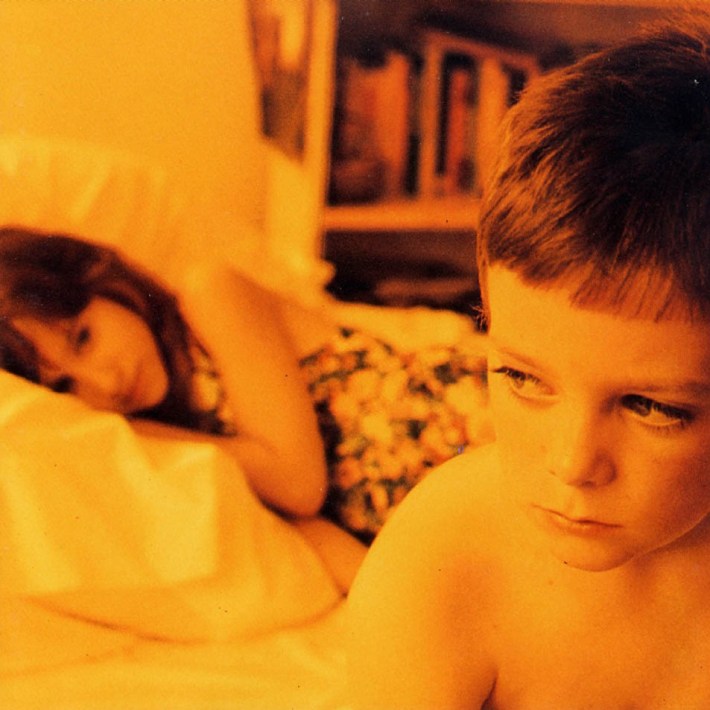
The Whigs knew they had something going for them on Congregation. On that album, their daring mixture of R&B and noisy grunge turned out far better in practice than it sounded on paper. After two years of touring and tweaking, the band perfected their experiment on their major label debut, Gentlemen. The album resulted in the Whigs' best commercial performance in their native country (it peaked at 13 on the Heatseekers Chart) as well as their greatest critical acclaim before or since, and the band's ardent fans still bemoan it for not performing better. It's clear in retrospect that the band's supporters -- if not the band members themselves -- fully expected Gentlemen to explode in commercial popularity the same way that major label debuts by their old Seattle peers Soundgarden and Nirvana did.
The Whigs, for the first time, sounded poised to do so. The sloppiness of their earlier efforts gave way to a confident four-piece wherein every band member had a distinct role and excelled in it. Steve Earle's drum performance -- his last on a Whigs album -- stays in the pocket, while Curley's bass propels the music forward. And while Dulli is content to spend most of the album riding palm-muted chords and a wah pedal, McCollum's squealing guitar leads become surprisingly effective accents.
It's no wonder, however, that the greater music buying community of the early '90s shied away from Gentlemen -- it's a hard, depressing album, full of filthy sexual liaisons and soaked in cynicism, misanthropy and, at times, startling misogyny. A loose concept album, Gentlemen unfolds like a psychosexual thriller, telling the story of a relationship dissolving under the weight of numerous infidelities. The story becomes even more unsettling when you take into account that Dulli wrote the album in the wake of a nasty breakup, and filled it with lyrical turns like "Ladies, let me tell you about myself / I've got a dick for a brain / and my brain is going to sell my ass to you," ("Be Sweet"). Mötley Crüe and their like were never so overt, but Dulli fills the record with such confessions.
And confession, really, is the name of the game. With its occasional piano accompaniment and big, reverberating sound, Gentlemen does feel holy at times. It even concludes with a song called "Brother Woodrow/Closing Prayer," a stately instrumental number. On the way there, the Whigs take their listeners through several eclectic shifts in sound -- on "Now You Know," McCollum pulls out a slippery bridge reminiscent of Jerry Cantrell's work before a honky tonk piano, courtesy of Harold Chichester, cools things down. Chichester became a frequent collaborator, contributing piano to the Black Love album before joining Dulli in the Twilight Singers. Meanwhile, the penultimate track, "I Keep Coming Back," is a Tyrone Davis cover -- the only R&B tune to ever make it onto an album proper, though Gentlemen's release was flanked by two EPs composed mostly of such covers, 1992's Uptown Avondale and 1994's What Jail Is Like.
In the record's first act, listeners are greeted with an unsettling, extended introductory track, followed by the fire-and-brimstone anthem of the title track, and then the even more unsettling "Be Sweet." Those first three tracks are the explosion, and "Brother Woodrow" is the moment at which the smoke is finally clear. In the debris, the Whigs focus on several more accomplished, soul-inspired ballads, such as the subtly vamping "When We Two Parted."
The album reaches its climax on arguably their greatest ballad and most unexpected curveball. "My Curse" flips the script on Dulli's woman-degrading main character, giving the microphone to his long-suffering lover, played by Marcy Mays of all-female Ohio rock band Scrawl. It's one of the tenderest songs in Dulli's discography and a striking look into the mind of someone in a codependent, abusive relationship: "And slave I only use / As a word to describe the special way I feel for you."
Gentlemen remains the Whigs' most popular album, having garnered its own 33 1/3 book installment and remaining in print on CD and LP. Dulli's never produced an album to receive as much critical acclaim as part of the Whigs or the Twilight Singers. From its bombastic opening to its understated end, Gentlemen remains a fine example of what exactly independent rock music is capable of accomplishing with major label money.
The Whigs knew they had something going for them on Congregation. On that album, their daring mixture of R&B and noisy grunge turned out far better in practice than it sounded on paper. After two years of touring and tweaking, the band perfected their experiment on their major label debut, Gentlemen. The album resulted in the Whigs' best commercial performance in their native country (it peaked at 13 on the Heatseekers Chart) as well as their greatest critical acclaim before or since, and the band's ardent fans still bemoan it for not performing better. It's clear in retrospect that the band's supporters -- if not the band members themselves -- fully expected Gentlemen to explode in commercial popularity the same way that major label debuts by their old Seattle peers Soundgarden and Nirvana did.
The Whigs, for the first time, sounded poised to do so. The sloppiness of their earlier efforts gave way to a confident four-piece wherein every band member had a distinct role and excelled in it. Steve Earle's drum performance -- his last on a Whigs album -- stays in the pocket, while Curley's bass propels the music forward. And while Dulli is content to spend most of the album riding palm-muted chords and a wah pedal, McCollum's squealing guitar leads become surprisingly effective accents.
It's no wonder, however, that the greater music buying community of the early '90s shied away from Gentlemen -- it's a hard, depressing album, full of filthy sexual liaisons and soaked in cynicism, misanthropy and, at times, startling misogyny. A loose concept album, Gentlemen unfolds like a psychosexual thriller, telling the story of a relationship dissolving under the weight of numerous infidelities. The story becomes even more unsettling when you take into account that Dulli wrote the album in the wake of a nasty breakup, and filled it with lyrical turns like "Ladies, let me tell you about myself / I've got a dick for a brain / and my brain is going to sell my ass to you," ("Be Sweet"). Mötley Crüe and their like were never so overt, but Dulli fills the record with such confessions.
And confession, really, is the name of the game. With its occasional piano accompaniment and big, reverberating sound, Gentlemen does feel holy at times. It even concludes with a song called "Brother Woodrow/Closing Prayer," a stately instrumental number. On the way there, the Whigs take their listeners through several eclectic shifts in sound -- on "Now You Know," McCollum pulls out a slippery bridge reminiscent of Jerry Cantrell's work before a honky tonk piano, courtesy of Harold Chichester, cools things down. Chichester became a frequent collaborator, contributing piano to the Black Love album before joining Dulli in the Twilight Singers. Meanwhile, the penultimate track, "I Keep Coming Back," is a Tyrone Davis cover -- the only R&B tune to ever make it onto an album proper, though Gentlemen's release was flanked by two EPs composed mostly of such covers, 1992's Uptown Avondale and 1994's What Jail Is Like.
In the record's first act, listeners are greeted with an unsettling, extended introductory track, followed by the fire-and-brimstone anthem of the title track, and then the even more unsettling "Be Sweet." Those first three tracks are the explosion, and "Brother Woodrow" is the moment at which the smoke is finally clear. In the debris, the Whigs focus on several more accomplished, soul-inspired ballads, such as the subtly vamping "When We Two Parted."
The album reaches its climax on arguably their greatest ballad and most unexpected curveball. "My Curse" flips the script on Dulli's woman-degrading main character, giving the microphone to his long-suffering lover, played by Marcy Mays of all-female Ohio rock band Scrawl. It's one of the tenderest songs in Dulli's discography and a striking look into the mind of someone in a codependent, abusive relationship: "And slave I only use / As a word to describe the special way I feel for you."
Gentlemen remains the Whigs' most popular album, having garnered its own 33 1/3 book installment and remaining in print on CD and LP. Dulli's never produced an album to receive as much critical acclaim as part of the Whigs or the Twilight Singers. From its bombastic opening to its understated end, Gentlemen remains a fine example of what exactly independent rock music is capable of accomplishing with major label money.
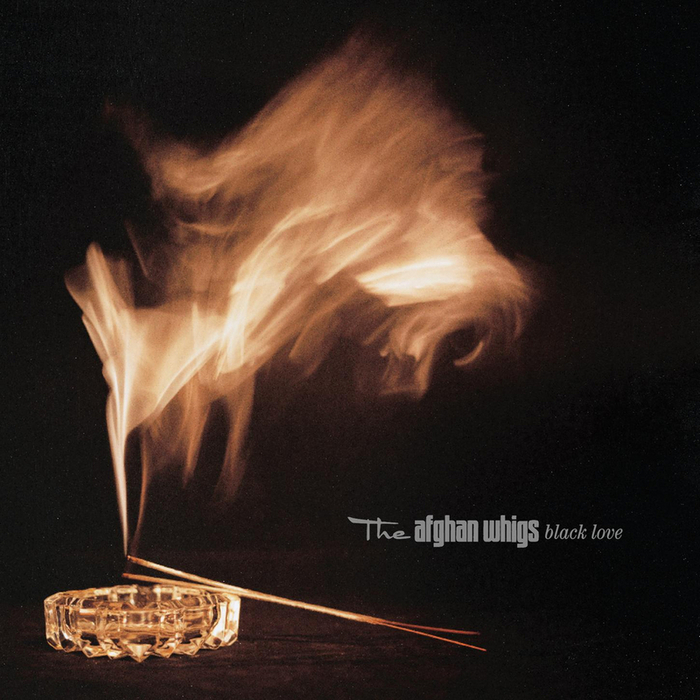
The fifth Whigs album presents the pinnacle of the virulent soul-rock formula that Dulli and company innovated on Congregation and fine-tuned on Gentlemen. Black Love is as focused as its predecessor, but presents a more colorful, varied sonic palate without feeling as melodramatic as the records that follow it. Still, its placement over Gentlemen will seem a bit contentious, even though Black Love is the fan-favorite. Gentlemen is the more classic record, partly because it was released first and partly because Black Love was a relative commercial disappointment (probably because Dulli successfully lobbied for "Honky's Ladder," maybe the least listener-friendly track on the record, to be released as its lead single). Still, Black Love is the darker, more complex record. While Gentlemen flows in one direction – downstream -- Black Love is a real roller coaster, with the most aggressive material in the band's repertoire as well as the most beautiful. Its willingness to curve in new directions is thrilling in the way albums like Wish You Were Here and Physical Graffiti are, which is why it is the best Afghan Whigs album.
After Gentlemen's success, Dulli leveraged his cultural currency toward Hollywood, scoring the soundtrack to Ted Demme's film Beautiful Girls and nabbing a cameo for the Afghan Whigs, performing a cover of "Can't Get Enough Of Your Love, Babe" on screen. Dulli planned to write, direct, and score his own noir movie, a project that never materialized, but the material intended for the soundtrack went on to become Black Love. Opener "Crime Scene Part One," which documents an ex-lover's suicide, gestures openly toward crime cinema; think of it as his musical rendition of the opening scene in Lethal Weapon, complete with Clapton-esque guitar. Elsewhere, "Going To Town" takes his romantic flings and injects them with unhealthy amounts of melodrama. Why just bang your girl when you can do so after a bit of mass arson? The Afghan Whigs fire on all cylinders on that song, marrying the obtuse lyrics to an infectious drum machine roll and an infectious mixture of funk and aggressive power chords.
Black Love offers several songs in that vein, each essential parts of the Whigs discography, including "My Enemy," maybe the most aggro piece of music Dulli has penned since his earlier punk days. "You want the dog? / I'll let him out / come and get some baby," Dulli growls, slashing at the neck of his guitar while then-new drummer Paul Buchignani rides the pocket harder than his predecessors. Even better is "Blame, Etc.," where the Afghan Whigs have completely digested their funk and soul influences, complete with syncopated organ hits on the black keys. Fitting, since the song was intended as a tribute to the late Temptations singer David Ruffin, whose infidelities become an ideal vehicle for the nastiness Dulli had been writing around since 1991. In many ways, the song is the centerpiece of Black Love -- the words of its chorus show up in "Crime Scene Part One," and, crudely, the co-opting of African American music idioms is as central a theme in the record as film noir and sexual deprivation are -- hence the title. But "Blame, Etc." also carries a certain vulnerability, which is so often lacking in sexualized rock music; to wit: "You were blind / but you are not alone in this / as I was once / like you." Throughout the two preceding records, the Afghan Whigs were trying to mine from soul and gospel music a kind of masculinity that carried bravado and a kind of tragedy as well, and on Black Love, they nail it.
For further proof, look no further than the record's incredible third act: "Bulletproof," "Summer's Kiss" and "Faded" each stand among the best songs Dulli's ever written and recorded. The sensitive balladeering that the Whigs first experimented on in Big Top Halloween hits its greatest stride in these three songs. Yes, the ballads that wrap up Gentlemen are excellent as well, but there's a sweetness and longing in "Bulletproof," when Dulli sings "Every time I dream about you, baby / With your hands all over me," that alludes to more than animal lust -- an idealized blend of '80s cock-rock swagger and '90s alternative emotionality. "Summer's Kiss" is genuinely sweet without being saccharine -- the song has enough pull with Afghan Whigs fans that Dulli's official fan page is named after it. And "Faded," with its soaring chorus, even-handed delivery, and masterful textures, is as essential a track as "Gentlemen." On "Faded," Dulli and the classic Whigs lineup put all of their strengths on display: nuanced and layered instrumentation coupled with great emotional songwriting and a powerful series of hooks. On their reunion tour, the Afghan Whigs closed their set with "Faded," thus ending their career-retrospective song set the same way they ended their best album. And now that the Whigs appear back in action for the foreseeable future, it's an ideal time to revisit -- or first experience -- one of the most interesting and satisfying discographies in contemporary rock music.
The fifth Whigs album presents the pinnacle of the virulent soul-rock formula that Dulli and company innovated on Congregation and fine-tuned on Gentlemen. Black Love is as focused as its predecessor, but presents a more colorful, varied sonic palate without feeling as melodramatic as the records that follow it. Still, its placement over Gentlemen will seem a bit contentious, even though Black Love is the fan-favorite. Gentlemen is the more classic record, partly because it was released first and partly because Black Love was a relative commercial disappointment (probably because Dulli successfully lobbied for "Honky's Ladder," maybe the least listener-friendly track on the record, to be released as its lead single). Still, Black Love is the darker, more complex record. While Gentlemen flows in one direction – downstream -- Black Love is a real roller coaster, with the most aggressive material in the band's repertoire as well as the most beautiful. Its willingness to curve in new directions is thrilling in the way albums like Wish You Were Here and Physical Graffiti are, which is why it is the best Afghan Whigs album.
After Gentlemen's success, Dulli leveraged his cultural currency toward Hollywood, scoring the soundtrack to Ted Demme's film Beautiful Girls and nabbing a cameo for the Afghan Whigs, performing a cover of "Can't Get Enough Of Your Love, Babe" on screen. Dulli planned to write, direct, and score his own noir movie, a project that never materialized, but the material intended for the soundtrack went on to become Black Love. Opener "Crime Scene Part One," which documents an ex-lover's suicide, gestures openly toward crime cinema; think of it as his musical rendition of the opening scene in Lethal Weapon, complete with Clapton-esque guitar. Elsewhere, "Going To Town" takes his romantic flings and injects them with unhealthy amounts of melodrama. Why just bang your girl when you can do so after a bit of mass arson? The Afghan Whigs fire on all cylinders on that song, marrying the obtuse lyrics to an infectious drum machine roll and an infectious mixture of funk and aggressive power chords.
Black Love offers several songs in that vein, each essential parts of the Whigs discography, including "My Enemy," maybe the most aggro piece of music Dulli has penned since his earlier punk days. "You want the dog? / I'll let him out / come and get some baby," Dulli growls, slashing at the neck of his guitar while then-new drummer Paul Buchignani rides the pocket harder than his predecessors. Even better is "Blame, Etc.," where the Afghan Whigs have completely digested their funk and soul influences, complete with syncopated organ hits on the black keys. Fitting, since the song was intended as a tribute to the late Temptations singer David Ruffin, whose infidelities become an ideal vehicle for the nastiness Dulli had been writing around since 1991. In many ways, the song is the centerpiece of Black Love -- the words of its chorus show up in "Crime Scene Part One," and, crudely, the co-opting of African American music idioms is as central a theme in the record as film noir and sexual deprivation are -- hence the title. But "Blame, Etc." also carries a certain vulnerability, which is so often lacking in sexualized rock music; to wit: "You were blind / but you are not alone in this / as I was once / like you." Throughout the two preceding records, the Afghan Whigs were trying to mine from soul and gospel music a kind of masculinity that carried bravado and a kind of tragedy as well, and on Black Love, they nail it.
For further proof, look no further than the record's incredible third act: "Bulletproof," "Summer's Kiss" and "Faded" each stand among the best songs Dulli's ever written and recorded. The sensitive balladeering that the Whigs first experimented on in Big Top Halloween hits its greatest stride in these three songs. Yes, the ballads that wrap up Gentlemen are excellent as well, but there's a sweetness and longing in "Bulletproof," when Dulli sings "Every time I dream about you, baby / With your hands all over me," that alludes to more than animal lust -- an idealized blend of '80s cock-rock swagger and '90s alternative emotionality. "Summer's Kiss" is genuinely sweet without being saccharine -- the song has enough pull with Afghan Whigs fans that Dulli's official fan page is named after it. And "Faded," with its soaring chorus, even-handed delivery, and masterful textures, is as essential a track as "Gentlemen." On "Faded," Dulli and the classic Whigs lineup put all of their strengths on display: nuanced and layered instrumentation coupled with great emotional songwriting and a powerful series of hooks. On their reunion tour, the Afghan Whigs closed their set with "Faded," thus ending their career-retrospective song set the same way they ended their best album. And now that the Whigs appear back in action for the foreseeable future, it's an ideal time to revisit -- or first experience -- one of the most interesting and satisfying discographies in contemporary rock music.
